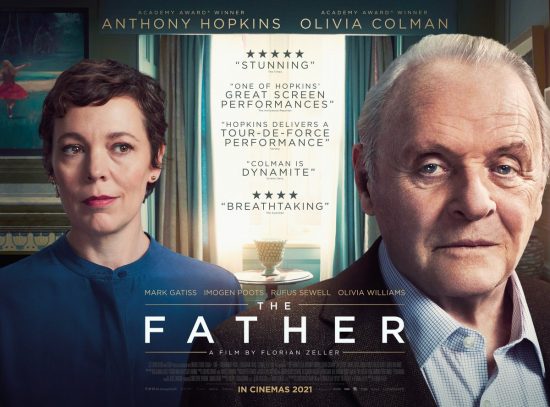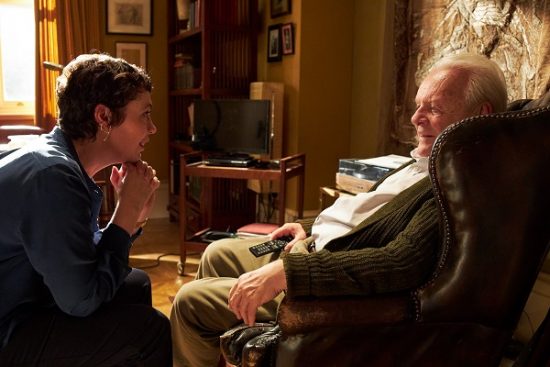Review: The Father – “A devastatingly beautiful gut-punch of a film”
I have now seen The Father twice and both times, as it reached its heart-shattering final act, I turned into a messy puddle of sobs and tears. Masterfully orchestrated in all departments, it’s hard to believe this is Florian Zeller’s feature debut. A devastatingly beautiful gut-punch of a film with an immense Anthony Hopkins, The Father is an emotional rollercoaster that aptly reminds us why only cinema can provide such level of catharsis. And though I may be a masochist, I find that kind of journey quite therapeutic.
It almost feels anticlimactic for the film to be finally released in the UK over a month after wrapping its triumphant awards season ride with those two extremely deserved Oscar wins for best-adapted screenplay and best actor in a leading role. Yet I applaud Lionsgate UK for patiently holding off until it was possible to launch the film exclusively in cinemas and I say that especially as someone who has only been able to watch it on a laptop via an online press screener.
Even if this is not a loud, CGI-heavy Hollywood blockbuster, experiencing it for the first time on the silver screen will make it even harder to shake off. The labyrinthine claustrophobia and colourful palette of its set design, the enveloping soundscape and the sparse but hauntingly beautiful score by Ludovico Einaudi and the hypnotic close-ups of Sir Anthony Hopkins breaking your heart are just made for and meant to be savoured in a movie theatre. Be ready to buckle up your heart!
Adapted by Zeller from his own award-winning play with the help of writer extraordinaire Christopher Hampton (Atonement, Dangerous Liaisons) who had already translated the stage version from French into English, The Father is far from being your run-of-the-mill, Oscar-bait melodrama about a terminal illness. It’s no spoiler that Anthony, our protagonist, is a man in his sunset years, affected by a progressively degenerating case of dementia. Yet the story isn’t focused on analysing the nature or details of his condition.
The film is a character-driven family drama executed with the suspenseful atmosphere of a thriller. From the very beginning, it exudes cinematic traits of what could be seen as a Hitchcockian version of Haneke’s Amour that blows up in your face with a Shyamalanesque twisted ending. What’s truly at stake here is the relationship between Anthony and his daughter Anne, played by Oscar-winner Olivia Colman with the kind of nuanced subtlety that only someone with her talent can convey.
The story kicks off with Anne visiting her old father in his lonely London flat like she does every day, as she’s clearly his sole carer. The man is listening to classical music with a pair of headphones and gets startled by the interruption. Anne informs him that she found someone new to take care of him after he drove away the most recent hire for allegedly stealing his watch. But Anthony is obviously against the idea of having a stranger in his home and claims to be perfectly capable of taking care of himself.
Anne however delivers a bit of destabilizing news: she’s met a man named Paul and she’s moving to Paris to be with him. She will come back to London on occasional weekends to visit Anthony but that’s why now more than ever he needs to establish a good rapport with his new carer. Anthony is taken aback by the news, feeling betrayed at first, then overwhelmingly sad at the thought of being left behind and eventually resistant and confrontational when Anne underlines that the other option would be a care home. This first sequence immediately showcases Anthony Hopkins’ bravura at conveying a multifaceted range of emotions within the span of seconds and it’s a powerful glimpse of the psychodrama we’re about to be swallowed in.
In the following sequence, Anthony comes home from grocery shopping, looking a bit frazzled. As he’s putting the stuff away, he gets startled once again by some noise. Heading into the living room, he finds a man (a deliciously ambiguous Mark Gatiss) who claims to be his daughter’s husband and that Anthony lives with them. Anne is apparently on her way back from getting some chicken for dinner. Anthony is confused as he replies that Anne is divorced and has just met a man and she’s planning to move to Paris with him. Confusion though turns into plain shock when Anne returns home, but she is a completely different woman, played by the wonderful Olivia Williams.
It’d be utterly criminal to divulge any further plot details, especially since this isn’t really a plot-heavy film. Let’s just say that the further you get into the story maze, the more you realise this is an intricate puzzle testing the audience by brilliantly placing them right inside the fractured mind of its protagonist. Even if like me, unfortunately, you have missed out on seeing the play, the stage origins of the source material are evident from the get-go but so is the amazing work of adaptation that Zeller and Hampton have done to make it beautifully cinematic.
The French playwright, now freshly minted filmmaker, deserves even more praise for his directorial work, particularly for the sensibility displayed in handling the performances of such a top-notch cast. From Williams and Gatiss to Rufus Sewell and Imogen Poots shining in supporting roles this film might not be as impactful without such excellent actors at the top of their game, led with such confidence by their director. And of course, Hopkins and Colman as the father-daughter duo at the heart of the story are simply sublime at conveying the thought-provoking themes at play.
The Father isn’t just about the tragedy of a man who’s starting to question the very fabric of his own reality and faces the progressive descent into the terrifying rabbit hole of his illness-stricken mind. The filmmakers reflect upon the way such tragedies affect the lives of a patient’s loved ones as well. They poignantly explore the difficult dilemma of a daughter torn between her love, sense of duty (despite the complicated relationship with her father) and having the right to live her own life without feeling heartless and selfish. Colman is perfect at portraying that emotional conundrum with class and genuine pathos without ever falling into the trap of over-the-top histrionics.
Saving the best for last, Sir Anthony Hopkins is an absolute wonder to watch from the first to the last frame he appears in. It’s astonishing how this incredible artist has honed his craft over his long and illustrious career and still manages to deliver such an outstanding performance at 83 years of age. He’s just a treasure and his second Oscar win was a no brainer. As previously mentioned, I couldn’t help but bawl my eyes out during the climax both times I’ve seen the film, and although that display of vulnerability alone is a masterclass in acting, Hopkins’ amazing talent shines even brighter during less obvious moments.
One scene in particular tug at my heartstrings as Anthony tries to find some respite from the overwhelming state of his mind by looking out his bedroom window and is captivated by a kid who’s playing pretend football with a plastic bag floating in the wind, which reminded me of the Wes Bentley’s infamous monologue in American Beauty. It’s a moment of everyday life that ignites a wide variety of feelings and Anthony’s tender smile conveys them all at once so genuinely.
As I was mesmerised by Hopkins’ insane artistry I was brought back to a moment in my childhood when on a summer holiday, I sneaked up on my dad from afar and witnessed him crying for the first time as he was mourning the loss of his mother. He was hiding that moment of vulnerability as if it was something to be ashamed of. Over a decade later, at the airport, as I was leaving to study film in the US, he cried for the first time before my eyes in a particularly emotional context, amplified by the fact he and my mother had just separated after 27 years of marriage.
Nine months later, as I was finishing my first year of film school in Los Angeles, he got sick and passed away abruptly at the age of 60. I didn’t manage to make it back home in time to say goodbye. Somebody I knew accused me and my sister of contributing to his demise because we left the nest to pursue our lives and that he got so depressed that when this abrupt illness hit him, he just let himself go. Even if nobody had the right to tell me how to live my life, I carry that sense of guilt to this day and I wish I’d had more time to explore and mend our complicated relationship.
The reason why I’m digressing into such personal, painful territory is to simply demonstrate the powerful impact that cinema and art in general have on the human condition. The level of catharsis I’ve reached by watching The Father twice over the span of three months is a testament to the craft of storytelling and its therapeutic effects. Anthony laying his soul bare on-screen and Olivia Williams’ character comforting him as if he was her own father was equal parts devastating and healing and that’s why I just want to say: thank you Florian Zeller and thank you Sir Anthony.
The Father is out in UK cinemas from June 11th












